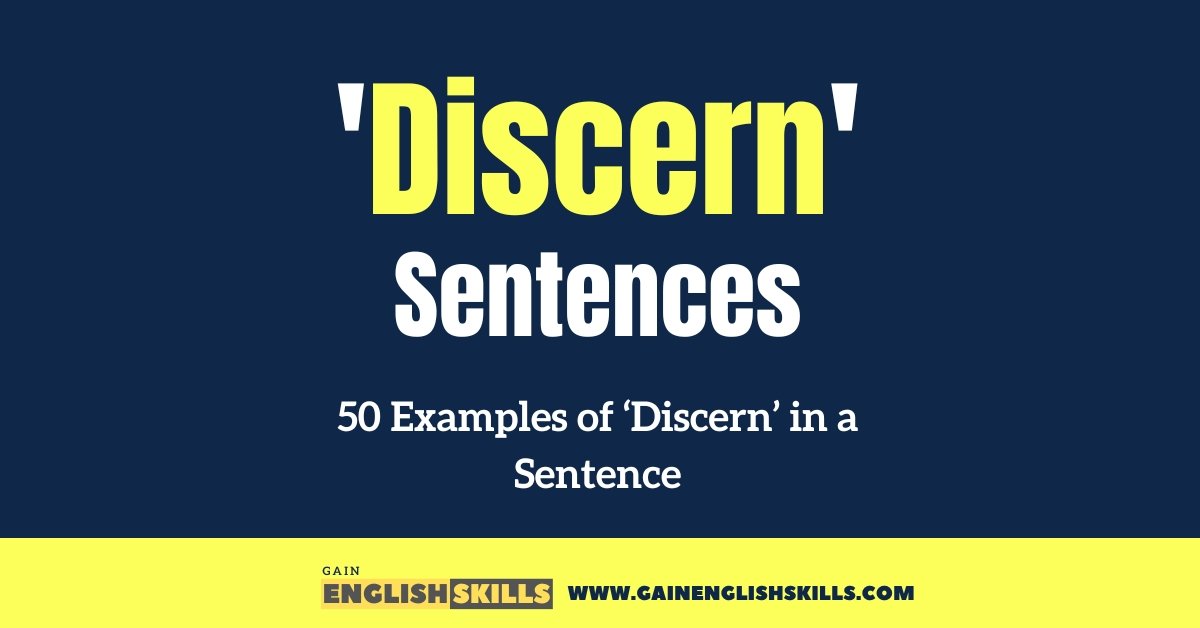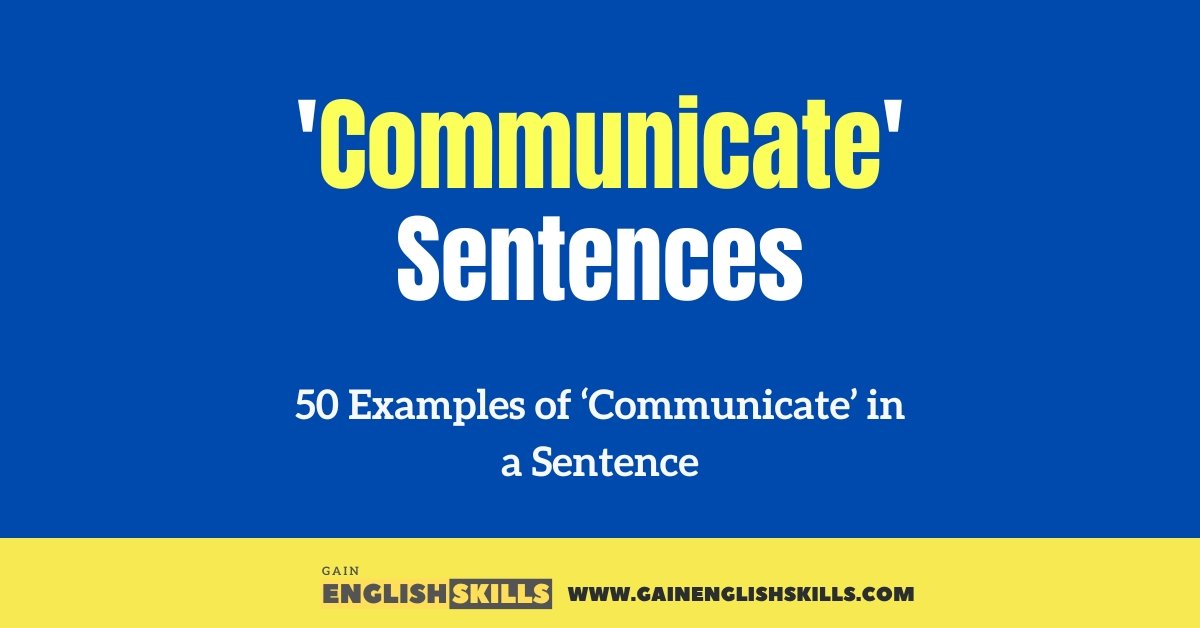50 Examples of ‘Discern’ in a Sentence
Hey there! In this blog post, we will see how we can use ‘Discern‘ in a sentence with the help of 50 examples. Ever wondered about the word ‘Discern’? Well, you’re in the right place. Today, we’re diving into the world of sentences where ‘discern’ plays a crucial role. Don’t worry; it’s not as complicated as it sounds. In fact, understanding how to use ‘discern’ in a sentence can add a valuable tool to your communication kit. So, let’s break it down.
You might have heard or read this term but may not be entirely clear on its usage. That’s alright; many people find it a bit confusing at first. Discern essentially means to perceive or recognize something with precision. It’s about distinguishing details, making sense of information, and having a keen awareness. In everyday language, it’s like having the ability to figure out what’s going on or noticing subtle differences. Now, let’s explore why mastering sentences with ‘discern’ can be beneficial for all of us.

Why We Need Sentences with ‘Discern’: Imagine being able to express yourself more precisely, whether in a conversation, an email, or any form of communication. That’s the power of incorporating ‘discern’ into your sentences. Let’s break down the concept.
What ‘Discern’ Means: Okay, let’s simplify it. Think of ‘discern’ as your superpower to pick up on details that others might miss. It’s like being the detective of conversations, understanding the nuances that can make a significant difference. For example, when you say, “I could discern the sincerity in her voice,” you’re essentially saying you could tell she was genuinely expressing herself.
Who Needs to Learn Sentences with ‘Discern’ and Why: Anyone who communicates with others can benefit from learning sentences with ‘discern.’ Whether you’re a student, a professional, or just someone who loves connecting with people, this skill is handy. It helps in understanding situations, people’s feelings, and the underlying meaning behind words. Imagine being in a meeting and saying, “I can discern the concerns raised by the team.” You’re conveying that you understand the worries without explicitly stating them.
Now, let’s dive into the real meat of this post – the sentences. We’ve compiled 50 examples to show you how ‘discern‘ can be seamlessly integrated into your daily conversations.
50 Examples of ‘Discern’ in a Sentence:
- I could discern a hint of sadness in her eyes.
- It’s challenging to discern the difference between the two paintings.
- He could discern the excitement in her voice.
- She could discern the truth from the lies.
- Can you discern the subtle flavors in this dish?
- We need to discern the main issues from the secondary ones.
- The detective could discern the crucial evidence.
- You can discern the passion in his words.
- She could discern the fear in his eyes.
- It’s essential to discern between reliable and unreliable sources.
- He could discern the importance of the moment.
- I can discern the sincerity in your apology.
- Let’s try to discern the main idea from the details.
- She could discern the changing dynamics in the room.
- It’s hard to discern the truth in a world full of lies.
- Can you discern the pattern in this sequence?
- He could discern the beauty in simplicity.
- It’s crucial to discern the consequences of our actions.
- I could discern a slight hesitation in his response.
- Let’s discern the pros and cons of this decision.
- She could discern the potential for success.
- Can you discern the underlying message in his words?
- It’s challenging to discern right from wrong in this situation.
- He could discern the genuine concern in her tone.
- Let’s discern the impact of this policy on the community.
- She could discern the genuine smiles from the fake ones.
- It’s crucial to discern the needs of your customers.
- He could discern the hidden agenda behind the proposal.
- Can you discern the difference in texture?
- I could discern the urgency in his request.
- Let’s discern the main themes in this piece of literature.
- She could discern the potential for growth in the market.
- It’s essential to discern the facts from the opinions.
- He could discern the subtle change in her mood.
- Can you discern the significance of this event?
- I could discern the effort he put into the project.
- She could discern the genuine interest in their questions.
- Let’s discern the impact of technology on our lives.
- It’s crucial to discern the relevance of the information.
- He could discern the cultural differences in their behavior.
- Can you discern the influence of this artist in the painting?
- I could discern the sincerity in their actions.
- Let’s discern the potential risks of this investment.
- She could discern the hidden meanings in his words.
- It’s challenging to discern the best course of action.
- He could discern the authenticity of the product.
- Can you discern the impact of climate change on the environment?
- I could discern the excitement in their faces.
- Let’s discern the core values of this organization.
- She could discern the genuine intentions behind the gesture.
In a nutshell, mastering the art of using ‘discern‘ in a sentence is like gaining a superpower in communication. It allows you to navigate conversations with precision, understand nuances, and express yourself more effectively. So, the next time you want to convey that you can pick up on the details, remember to incorporate ‘discern’ into your sentences.
In conclusion, don’t underestimate the impact of this simple word in enhancing your communication skills. As you practice incorporating ‘discern’ into your sentences, you’ll find yourself better equipped to understand and convey the subtleties of various situations.
Now, go ahead and experiment with these sentences in your daily conversations. You’ll be surprised at how seamlessly ‘discern‘ can become a part of your everyday language.
Frequently Asked Questions about ‘Discern’
Q1: What does ‘discern’ mean?
A1: ‘Discern’ means to perceive or recognize something with precision. It’s about distinguishing details and having a keen awareness. For example, you might discern someone’s emotions by their tone of voice.
Q2: Why is it important to learn sentences with ‘discern’?
A2: Learning sentences with ‘discern’ is essential for effective communication. It helps you express yourself more precisely and understand the subtleties of situations, making you a better communicator.
Q3: Who can benefit from using sentences with ‘discern’?
A3: Anyone who communicates with others can benefit from using sentences with ‘discern.’ Whether you’re a student, a professional, or just someone who enjoys connecting with people, this skill is valuable.
Q4: Can you provide a simple example of ‘discern’ in a sentence?
A4: Certainly! “I could discern the honesty in her words” indicates that you could recognize the sincerity in what she said.
Q5: How can ‘discern’ be used in everyday conversations?
A5: You can use ‘discern’ in everyday conversations to express your ability to notice and understand details. For instance, “I can discern the changes in the project timeline.”
Q6: Are there any tips for incorporating ‘discern’ into sentences naturally?
A6: Absolutely! Practice using ‘discern’ in various contexts. Start with simple sentences and gradually incorporate it into more complex conversations. Soon, it’ll become a natural part of your communication.
Q7: Can ‘discern’ be used in professional settings?
A7: Certainly! Using ‘discern’ in professional settings can convey a strong sense of perception and attention to detail. For example, “I can discern the market trends based on the data analysis.”
Q8: How can I improve my ability to ‘discern’ in real-time conversations?
A8: Pay close attention to details, listen actively, and practice reflective thinking. The more you engage with others, the better you’ll become at discerning subtle cues and nuances.
Q9: Are there any common misconceptions about using ‘discern’ in sentences?
A9: One common misconception is that ‘discern’ is reserved for formal situations. However, it can be seamlessly integrated into both casual and formal conversations to convey precision and understanding.
Q10: Can ‘discern’ be used to express uncertainty or ambiguity?
A10: No, ‘discern’ is more about clarity and precision. It’s used to convey a clear understanding or perception of something rather than uncertainty. For instance, “I could discern the main idea from the details provided”.








